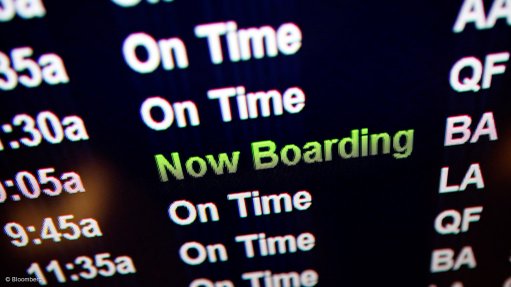
Photo by: Bloomberg
Africa’s aviation industry will do well to follow the example of the US and the European Union by consolidating its airline capacity, pushing for a regional and continental air traffic control body and intensifying bilateral air traffic agreements, privately-owned carrier Comair CEO Eric Venter has argued.
Addressing the Transport Forum at the University of Johannesburg on Thursday, he said global overcapacity had driven the consolidation of airlines in several markets, such as the US, in which the number of independent carriers had, in recent years, narrowed from 25 to 10.
As a result, these operators were now starting to show “decent profits”, enabling investment in new fleets.
“In contrast, Africa has 227 airlines, many of which only have one or two planes; every country seems to want its own carrier. We need to start treating Africa like the European Union and consolidate our airlines.
“We’re still a long way away from this, though, because countries just don't want to give up their national carriers,” Venter outlined.
Noting that “it was all political”, he added that Africa’s numerous air traffic control regions – each of which had its own policy, requirements and preferred language of operation – further exacerbated the fragmentation of the continent’s aviation industry.
Africa currently had 52 air traffic control regions, while the US – one of the world’s largest air travel regions – had only two.
“Air traffic control in Africa is a little unsafe [as well as] complicated. For example, if you’re flying to Lagos, in Nigeria, from Johannesburg, you pass through seven or eight control areas.
“[However,] the political will to let go of air traffic control and to move to a centralised system does not exist,” Venter commented.
Further complicating the liberalisation of South Africa’s aviation industry, he noted, was the preference afforded to national carrier South African Airways, which held “most of the rights” to travel between South Africa and other African States.
Venter’s comments came amid media reports on Wednesday that the beleaguered airline had again approached National Treasury to approve a loan guarantee, giving rise, once again, to debates around the true state of competitiveness in the South African airline industry.
‘SEAT ONLY’ CONCEPT
Meanwhile, Venter told delegates that, while passenger volumes in Africa had stagnated since 2008, airline capacity had continued to expand, increasingly compelling carriers to implement measures aimed at limiting increases in ticket prices.
This had led to the growing popularity of “seat only” fares, in which passengers paid only for their seat on the plane and paid additional fees for checked-in baggage, seat selection and flexible tickets.
“This is something that South Africa will have to get used to, as it’s still quite tame here,” Venter noted.
Airlines were also increasingly relying on “cross-selling” or “up-selling” by coupling the sale of airline tickets with car hire, taxi services or hotel bookings.
“Some airlines make no money from selling airline tickets, but rather find their margins in the sale of associated products. Irish low-cost airline Ryan Air, for example, earns all its money from airport concessions and it’s still the most profitable airline in the world,” he pointed out.
According to Venter, this essentially subsidised air travel, which was becoming increasingly expensive owing to fuel costs and exchange-rate fluctuations.
The global aviation industry had experienced “massive” cost escalations since 2001, Venter added, owing largely to the right-sizing of fleets and increasing fuel prices.